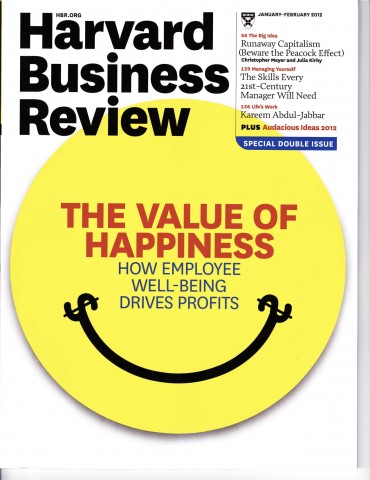
Do you have any idea how happy I was to see my January/February 2012 issue of the Harvard Business Review with this cover? “The Value of Happiness: How Employee Well-Being Drives Profits.” My good cheer was palpable. This further confirms all that I have learned about the Science of Happiness at Work and the Performance-Happiness Model.
The issue has several articles that make good points.
The Economics of Well-Being: This article points out how GNP and GDP (which measure wealth by income generated) don’t take into account the unpaid good in society (volunteering, child rearing, etc.) yet do include the paid “bad” such as the money generated by building prisons, paying lawyers for divorces, etc. It talks about metrics like the Human Development Index (we’re 4th after Norway, Australia and the Netherlands) and Human Development, Adjusted for Inequality (we don‘t place). The main gist of the article is about the history of how well-being intersects with economics and what direction it’s headed. Good news: it’s headed toward looking more closely at happiness and quality of life as indicators of wealth. The countries of Bhutan and Great Britain are on the leading edge of that new measurement.
 The Science Behind the Smile: Researchers are now measuring happiness and defining what really makes people happy. It’s not what you think. Yes, people who are rich, in a good relationship, actively participating in their church and healthy are happier overall. But events like getting a promotion, a new house or car or acing an exam only create more happiness for about three months. The frequency of positive experiences is more important than the intensity. And at work, what really contributes most to happiness is feeling appropriately challenged—when you’re striving to achieve goals that are ambitious but not out of reach. Managers take note: happier workers are more productive and creative. Years of research on rewards and punishment present a very clear finding: rewards work better.
The Science Behind the Smile: Researchers are now measuring happiness and defining what really makes people happy. It’s not what you think. Yes, people who are rich, in a good relationship, actively participating in their church and healthy are happier overall. But events like getting a promotion, a new house or car or acing an exam only create more happiness for about three months. The frequency of positive experiences is more important than the intensity. And at work, what really contributes most to happiness is feeling appropriately challenged—when you’re striving to achieve goals that are ambitious but not out of reach. Managers take note: happier workers are more productive and creative. Years of research on rewards and punishment present a very clear finding: rewards work better.
Creating Sustainable Performance: “If you give your employees the chance to learn and grow, they’ll thrive—and so will your organization.” How do you create an environment where employees feel that they are learning, achieving their potential and contributing to something that matters? Do all of the following:
- Give them decision-making discretion.
- Share information.
- Minimize incivility.
- Offer performance feedback.
These four tactics work together to create a culture where your employees can thrive. This mindset is contagious. And drives better performance in a sustainable way.
Positive Intelligence: More research shows that when people work with a positive mindset, every business outcome shows improvement. That includes greater productivity, creativity, customer service and sales, and less sick time and turnover. And while we believe that happiness is mainly determined by genetics and environment, there is much that we can do to increase our levels and frequency of happiness. Three activities the author recommends:
- Develop a habit that trains your brain to be happier (i.e., meditate at your desk for 2 minutes, exercise for 10 minutes, write a positive message to someone in your social support network or write down three things each day that you are grateful for). See my blog on What Went Well for more details on this.
- Help your coworkers—research shows that people with high levels of social support reap many benefits including better health, more promotions and better customer experiences.
- Mitigate stress. Although stress is an inevitable part of work and can sometimes enhance your performance, getting stressed out about things outside of your control is harmful. Next time you are feeling overly stressed, make a list of the things that are causing the stress. Separate these stressors into two types: the things you can change and the things you cannot. Then choose one that you can change and take one concrete step toward mitigating that stressor.
I’d like to help you become happier at work. Start by taking a free assessment at http://tinyurl.com/free-Capiche-survey. Then call me for a complimentary coaching session to explore what you can do to increase your happiness at work—and increase your productivity and value to your company.





